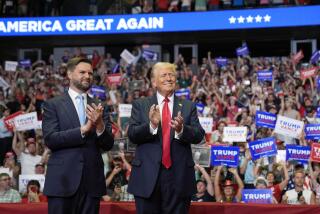Public Broadcasting Group Links Funds to Donor Policy
The group charged with distributing more than $200 million in federal funds to public broadcasting stations said Friday that it will grant money only to stations that ban trading names of their contributors with political organizations.
The Corporation for Public Broadcasting took the step in response to recent revelations that some stations had swapped donor information with Democratic fund-raisers, a practice that angered many Republican lawmakers and jeopardized continued government funding for public television and radio.
“It’s about our bond with our viewers and listeners. That’s a core issue for us,” Robert T. Coonrod, the corporation’s president, said in a statement. “Our goal is to restore the public’s trust in the work public broadcasting does every day.”
The new policy affects funding during the next fiscal year. The corporation said that it has a $267-million pot that it will disburse among nearly 1,000 nonprofit radio and television stations that rely on federal money, along with private donations, to stay afloat.
The rules also require stations to give their donors the option of not having their names disclosed to other organizations, and they call on stations to keep better records of their fund-raising efforts.
CPB sent the rules to the stations Thursday with a stern warning that the future of public broadcasting “relies on a bond of public trust.”
“It’s a big step,” said Jeannie Bunton, communications director for CPB.
But the action is unlikely to satisfy all of public broadcasting’s critics in Congress. Both Democrats and Republicans have voiced support for a measure that would make it illegal for public stations to trade their donor lists with political groups.
“It will take congressional action to finally put an end to this unsavory practice,” said Ken Johnson, spokesman for Rep. W.J. “Billy” Tauzin (R-La.), chairman of the House panel that oversees public broadcasting.
“Unfortunately,” Johnson added, “some of the trust has been eroded, and we’re going to take matters into our own hands.”
Top public broadcasting executives were called before Tauzin’s Commerce subcommittee July 20 to respond to the revelations. The executives told the panel that they had so far identified about 30 stations in the largest markets that exchanged contributor names with political organizations.
The executives apologized for sharing the lists and pledged a full internal investigation of the practice. They also promised to establish policies to discourage their stations from sharing information with political entities.
The effect of the rules announced Friday may not be as broad as predicted.
Under intense scrutiny in recent weeks, many stations already have approved similar policies. And WGBH in Boston has said that, even though it had rules in effect that barred contact with political groups, its donor lists were released to the Democratic National Committee anyway.
More to Read
Sign up for Essential California
The most important California stories and recommendations in your inbox every morning.
You may occasionally receive promotional content from the Los Angeles Times.






